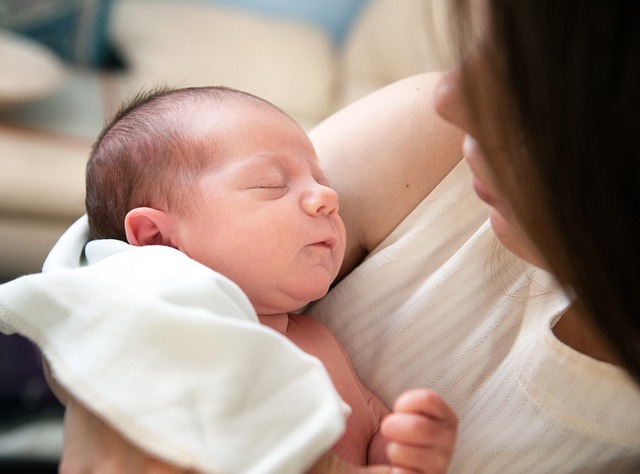It’s International Day of the Midwife today – and here’s the third part of our celebrations to honour the contribution made by midwives at NHS Humber Health Partnership.
Today, we’re sharing the stories of Debbie, Katie, Amy, Paula and Emma about their experience of being midwives and delivering the best in maternity care.
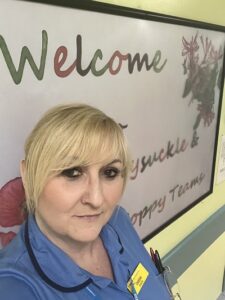 Debbie Perrin, Community Midwife in Grimsby
Debbie Perrin, Community Midwife in Grimsby
With four grown-up children and three grandchildren, Debbie Perrin became a midwife eight years ago, fulfilling a childhood ambition.
Debbie started working as a health care assistant and studied for her degree in midwifery at the University of Hull. She worked in Hull for five years as a rotational midwife and has been a community midwife in Grimsby for two years and nine months.
She’s got great advice for anyone thinking about becoming a midwife. “Don’t hesitate,” she says “It’s an honour to be with people at this time in their lives and it’s such a rewarding job.”
No two days are the same for Debbie, working in the community to deliver maternity care at all stages of pregnancy from antenatal care to post-natal support and initial baby checks.
While the worst part of the job is when a pregnancy doesn’t go to plan and a family suffers bereavement, the best part happens every day.
“It’s building rapport with them,” she says. “Working in the community, we get to provide a certain level of continuity of care and support so we get to know them and their families at the different stages of their journey.”
On International Day of the Midwife, Debbie will be enjoying a well-earned day off.
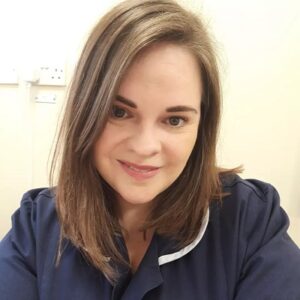 Senior Midwifery Sister Katie Headlam, Fatima Allam Birth Centre
Senior Midwifery Sister Katie Headlam, Fatima Allam Birth Centre
She had originally planned to study French at university but decided her future lay in a profession that was “a bit more useful and rewarding” and switched to midwifery instead.
Now a Senior Midwifery Sister working in the Fatima Allam Birth Centre in Hull, Katie Headlam says the best part of her job is making a difference to the lives of everyone who walks through the doors.
“Being able to support women, birthing people and their families is really important to me and I always enjoyed working clinically,” she says. “I don’t do this as often now, but I hope I support them through ensuring my staff are well looked after.
“I really enjoy making a difference to my teams and seeing them develop as midwives and progress in their careers. I feel so lucky to work alongside some of the most caring and talented people you could wish to meet.”
She started training as a midwife in Leicester in 2004, qualified in 2007 and, for the first years, worked as a Staff Midwife rotating in different areas including the Labour Ward and the Antenatal Ward.
She moved to a different trust just outside London in 2010 and attended her first homebirth.
“This really changed my practice and I developed a real passion for midwifery led care,” Katie says.
She worked as a Community Midwife while continuing shifts in the Labour Ward and then became a Deputy Specialist Midwife, focusing on screening and foetal medicine, before returning to her roots in East Yorkshire in 2018 when she was offered the position in the Birth Centre.
“No two days are ever the same and going home “on time” is never guaranteed,” she says
Part of the Midwifery Management Team, Katie undertakes Operational Lead shift, with oversight of the maternity unit at Hull Women and Children’s Hospital, and she starts every day ensuring the team at the Birth Centre have all they need to deliver the best possible care.
“The Midwifery Managers and I may need to meet to ensure the unit is staffed safely and to resolve any ongoing or acute issues,” she says. “I regularly liaise with the wider Multi-Disciplinary Team (MDT) about those wishing to come to Fatima Allam Birth Centre who may have additional needs regarding their birthing considerations.”
She also arranges teaching sessions, such as emergency birthing pool evacuation, attends local and national meetings to improve maternity services.
“I have so many midwifery memories,” she says “Probably some of my fondest memories are when I was a Community Midwife in Stevenage in the early 2010s: it really felt like “Call the Midwife”.
“I have also been very lucky to meet some famous and very inspiring midwives such as Sheena Byrom, Ina May Gaskin and Jacqueline Dunkley-Bent when she visited the Fatima Allam Birth Centre.”
She offers this advice to anyone considering a career in midwifery. “In order to provide the best care you have to learn how to read a room within about ten seconds and be able to quickly form excellent rapports with people and gain their trust, often in quite unusual circumstances, such as in very advanced labour. Lastly, that it is an absolute myth that you need to have had children yourself to be a good midwife.”
Today, Katie is celebrating International Day of the Midwife on a weekend away with other midwives. “I am sure we will have a drink or two for our colleagues to celebrate and share some of our midwifery memories together.”
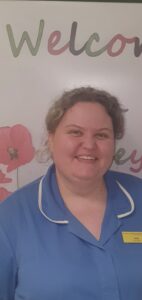 Amy Farrow, Continuity Midwife in Grimsby
Amy Farrow, Continuity Midwife in Grimsby
A high point in Continuity Midwife Amy Farrow’s career so far is caring for a woman through her surrogacy journey.
“The atmosphere in the room was second to none – such excitement, love and joy,” Amy says. “Caring for the parents and their newborn baby was delightful. It was a pure privilege.”
Amy wanted to become a midwife after having her own three children and qualified in 2020.
She worked on Jasmine Team before joining Poppy Continuity Team in 2021, building up relationships throughout the stages of pregnancy as they attend their appointments at Diana, Princess of Wales Hospital in Grimsby as well as in a community setting in the town one day a week.
“Working in the continuity team, I get to build rapport with women and their families, setting them at their first booking appointment, throughout their pregnancies and then as a family once their babies are born,” she says.
Amy, who will be on shift today as we mark International Day of the Midwife, advises anyone considering a job in midwifery to “do it. She says: “Studying is hard work but worth it.”
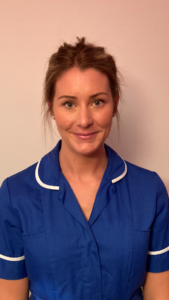 Paula Clayton-Hill, midwife on Rowan Ward at Hull Women and Children’s Hospital
Paula Clayton-Hill, midwife on Rowan Ward at Hull Women and Children’s Hospital
She’d originally planned to become a hair stylist when she left school but Paula Clayton-Hill used to listen to her two friends talk passionately about training to become midwives and decided to join them.
Now, Paula works as a Midwife on Rowan Ward, the postnatal care ward at Hull Women and Children’s Hospital in Hull, and in the community.
Paula says: “I left school at 16 and attended college to become a hairstylist so I didn’t have A Levels and completed an access to healthcare level 3 course at York College in 2013 followed by my midwifery training at The University of Bradford.
“I worked at Bradford Teaching Hospitals Foundation Trust for just under 18 months before moving to Hull as it’s my local trust.”
Her shift at the hospital starts with an early handover at 7am, learning about the people on the ward who’ve given birth to their babies and then go round the wards checking everyone has what they need such as pain relief or to answer all questions or concerns they might have.
“We complete all checks and postnatal examinations, we make a plan of care for each parent and newborn and communicate this to them,” Paula says. “We then discharge those who are ready to go home with their newborns and welcome new people onto the ward throughout the day.
“At some point, we try to find time for lunch!”
Her best memories so far have been when she worked with Poppy Continuity Team, supporting families from the start of their pregnancies right through to birth and beyond.
“Some of the Poppy babies and families will always hold a special place in my heart,” Paula says. “The midwives I worked with in the team were amazing midwives and taught me so much in our time together. We were like a family of midwives, all of us different with different strengths, blended together to provide the most amazing care.”
She advises anyone thinking about a midwifery career to be mindful that while rewarding, there are ups and downs. “Midwifery is not just about delivering babies, but about caring, nurturing and empowerment from conception to the postnatal period.”
On Sunday, Paula will be spending time with her husband and two children at her home in Market Weighton. Have a great day, Paula!
Labour Ward Co-ordinator Emma Coulson
Emma has 22 years’ service in the NHS and qualified originally as a nurse before switching to midwifery.
She worked as a rotational midwife at Hull Women and Children’s Hospital for three years to build up her confidence and skills in the antenatal, labour and postnatal wards.
Emma then became a core midwife on the labour ward and recently became a Junior Sister before securing her current position as Labour Ward Co-ordinator in Hull.
“This is something I have aimed to do for a few years and am so proud to have achieved,” she says. “I am looking forward to the challenge and supporting the team.
“I believe I work with a brilliant professional, caring team and we all pull together for each other and for the women, babies, parents-to-be and families we care for.”
Her shift starts with supporting and co-ordinating staff, organising solutions to any issues which are arising.
“I constantly need to be aware of what’s going on, not only on my ward but having good communication with all areas in the hospital to ensure safety high standards and priority of care,” Emma says.
The best part of her job is that no two days are the same. “I meet different people who have different stories, background and journeys,” she says. “I get to support and share in such a personal precious event. I have so many lovely memories over the years and I still get emotional.
“Over the years I have been involved in the care of families I have previously cared for and I’ve also been part of the care for friends and colleagues. That’s extra special.”
Her best advice is to ensure you treat everyone as you’d expect to be treated yourself or would wish your family or friends to be treated.
“The job is hard work, challenging in many ways physically and emotionally but it is also very rewarding. Good communication, caring, listening , compassion , empathy and teamwork is key.”

